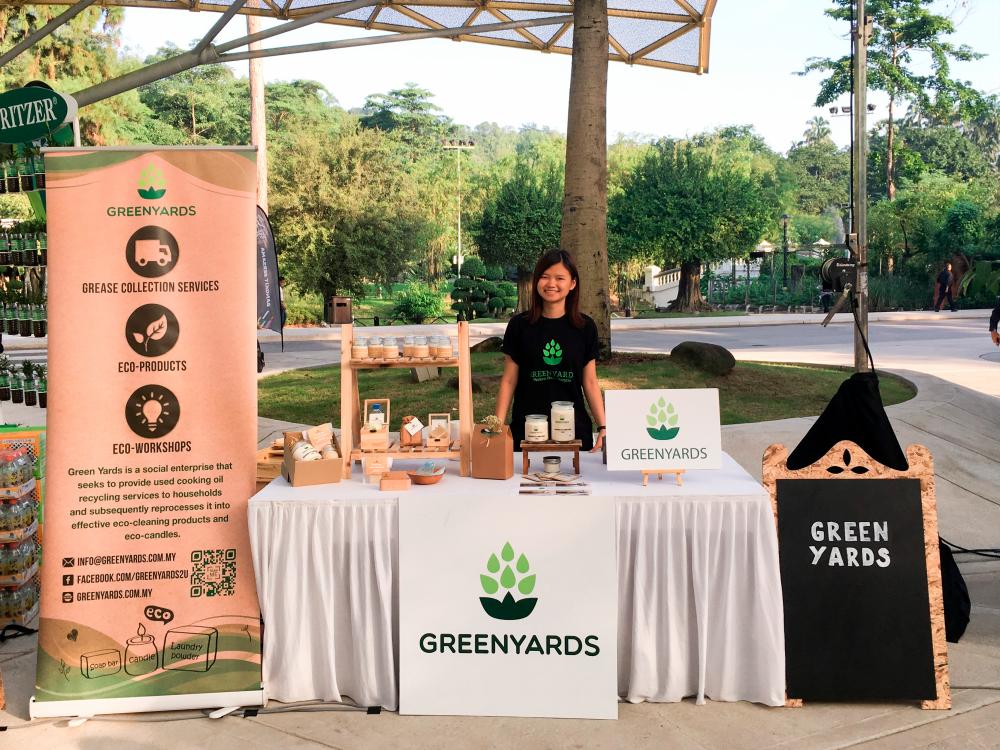IN A 2016 study on the water quality commissioned by the River of Life project, food waste – specifically used cooking oil – was identified as the main pollutant in the eight rivers around Kuala Lumpur and Selangor.
That same year, another study determined that each household in the country uses at least 2kg of cooking oil per month, 45% of which is poured directly down the sink – and into our rivers – once it cannot be reused.
In 2017, worried about this issue, Chia Wen Shin founded the enterprise Green Yards to provide an alternative channel for local communities to dispose of used cooking oil and subsequently process it into soap bars, candles, and powder detergent.
The 27-year old’s ‘acts of green’ were recently recognised on the global stage. Chia was named among Forbes 30 Social Entrepreneurs Under 30 in Asia for 2019 for her vision and innovations in technology.
Why did you establish Green Yards?
“I founded Green Yards because I had a hard time searching for environmental jobs at that time, then I figured why not turn what was initially a university project into a sustainable business that could also bring good to the environment?”
When exactly did you realise that you needed to make a change for the better?
“I’ve always known, it’s just a matter of how I can help or contribute to the environment differently. Recycling bins for paper, plastic, tin cans and glass are so common and accessible to the public.
“Some time ago, I did a survey on how people would dispose of their used cooking oil; they either pour it [down] the kitchen sink or flush it down the toilet bowl, which is so shocking to hear.
“I once went to a house to collect used cooking oil and found out the family had been keeping the oil in a bottle for five years, because they felt guilty [disposing it down] the kitchen sink.
“The idea to turn used cooking oil into soap bars and candles is nothing new, it has been popularised in Taiwan and Japan but not in Malaysia.”
How is used cooking oil processed into new products?
“The process is very much similar to that of all the handmade soap and candles available in the market, except the oil we’re using is different. We process used cooking oil with a very specific microfilter that will eliminate all impurities and pungent smells, then we’ll add fragrance (essential oil) to the mixture.”
The public is clearly aware of our current environmental problems, but does not immediately want to take action. Why?
“There are differing schools of thought on this matter. Some are open to the idea of taking action but not necessarily willing to take that extra step out of convenience, some say NGOs and government institutions are already tackling the issue, hence they think that a single effort won’t make a big change.
“For residents in villages or rural areas, joining this effort could cost them more, so naturally, they have to prioritise their living needs before anything else.”
How can the public adopt the zero-waste movement?
“There has been an increase in zero-waste stores around KL, and even some of the larger supermarkets are starting to jump on the bandwagon. They offer consumers the opportunity to shop for foods and even household items in bulk.
“Other than that, we can consciously look out for alternatives and avoid packaged goods to reduce daily waste, and to live sustainably.”
What are some habits everyone could begin practising today to protect the environment?
“The easiest habit everyone can practise is to save water and [reduce] electricity consumption.
“It does not require any more effort than just remembering to turn off the water tap, and to switch off the lights upon leaving the room.
“Another one would be to bring reusable bags to replace plastic bags, or simply just decline plastic packaging including straws, cups and bottles.”
What are your future plans?
“I hope that we can increase the number of our collection points, so that cooking oil recycling would be as common as paper recycling.”
What is a motto you live by?
“It’s a quote by Richard Branson: ‘If somebody offers you an amazing opportunity, but you are not sure you can do it, say yes – then learn how to do it later’.”









